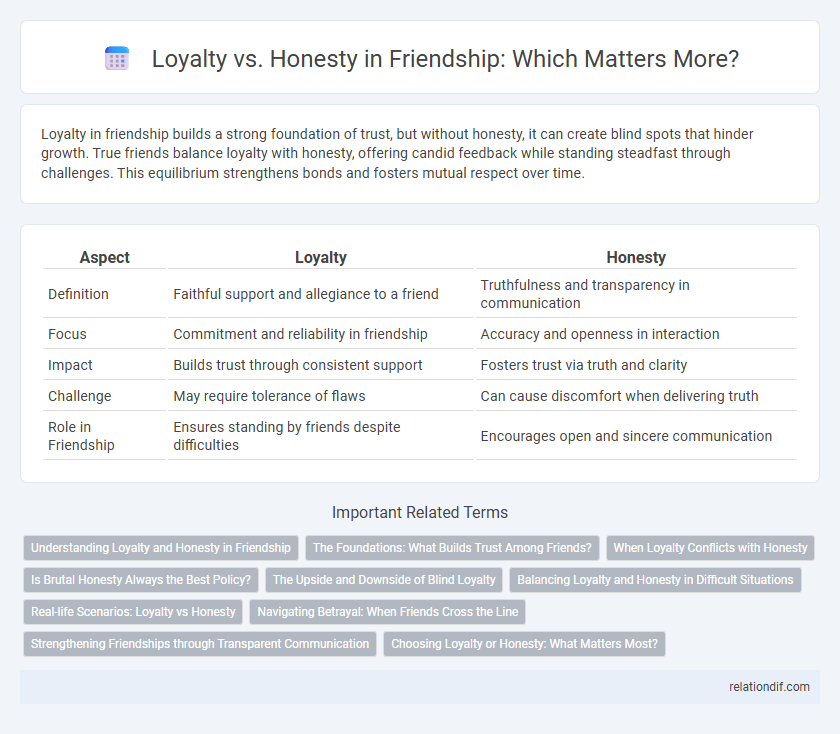Loyalty in friendship builds a strong foundation of trust, but without honesty, it can create blind spots that hinder growth. True friends balance loyalty with honesty, offering candid feedback while standing steadfast through challenges. This equilibrium strengthens bonds and fosters mutual respect over time.
Table of Comparison
| Aspect | Loyalty | Honesty |
|---|---|---|
| Definition | Faithful support and allegiance to a friend | Truthfulness and transparency in communication |
| Focus | Commitment and reliability in friendship | Accuracy and openness in interaction |
| Impact | Builds trust through consistent support | Fosters trust via truth and clarity |
| Challenge | May require tolerance of flaws | Can cause discomfort when delivering truth |
| Role in Friendship | Ensures standing by friends despite difficulties | Encourages open and sincere communication |
Understanding Loyalty and Honesty in Friendship
Loyalty in friendship signifies unwavering support and commitment, fostering trust and emotional security between friends. Honesty involves transparent communication and truthfulness, which can strengthen the bond by preventing misunderstandings and promoting mutual respect. Balancing loyalty and honesty cultivates a resilient friendship where both trust and authenticity coexist.
The Foundations: What Builds Trust Among Friends?
Trust among friends is built on a foundation of both loyalty and honesty, where loyalty provides a sense of unwavering support and honesty ensures transparent communication. Loyalty fosters emotional security, making friends feel valued and protected, while honesty cultivates authenticity, allowing deeper understanding and resolution of conflicts. Together, they create a resilient bond that withstands challenges and nurtures lasting friendships.
When Loyalty Conflicts with Honesty
Loyalty in friendship emphasizes unwavering support and trust, while honesty demands transparency and truthfulness, even when it risks causing discomfort or conflict. When loyalty conflicts with honesty, navigating situations where protecting a friend may require withholding the truth challenges the core values of the relationship. Prioritizing open communication and mutual respect enables friends to balance loyalty without compromising authenticity and trustworthiness.
Is Brutal Honesty Always the Best Policy?
Brutal honesty in friendship can strengthen trust but risks damaging feelings when delivered without empathy. Loyalty often requires balancing truth with kindness to maintain a supportive and lasting connection. Navigating honesty and loyalty ensures that friends feel valued rather than hurt by harsh truths.
The Upside and Downside of Blind Loyalty
Blind loyalty in friendship can create unwavering support and a strong sense of belonging, fostering trust and emotional security. However, it risks suppressing honesty, leading to unresolved conflicts, enabling harmful behaviors, and damaging long-term trust. Balancing loyalty with truthful communication is essential for maintaining authentic and healthy relationships.
Balancing Loyalty and Honesty in Difficult Situations
Balancing loyalty and honesty in difficult situations requires maintaining trust without compromising truth, as genuine friendships thrive on transparent communication. Prioritizing honesty fosters respect and mutual understanding, while loyalty ensures unwavering support during challenges. Navigating this balance enables friends to strengthen bonds without sacrificing integrity or emotional safety.
Real-life Scenarios: Loyalty vs Honesty
In real-life scenarios, loyalty often involves standing by a friend during difficult times, while honesty requires delivering truth even when it may hurt. Balancing these values means recognizing when transparency fosters trust versus when protecting a friend's feelings takes precedence. Effective friendships thrive on discerning which approach best supports mutual respect and long-term connection.
Navigating Betrayal: When Friends Cross the Line
Navigating betrayal in friendship requires balancing loyalty with honesty, as true loyalty does not excuse deceit or harm. When friends cross the line, transparent communication and setting boundaries become essential to rebuild trust or decide on moving forward. Prioritizing emotional integrity helps protect mental well-being and fosters healthier, more genuine connections.
Strengthening Friendships through Transparent Communication
Loyalty in friendship builds trust, but honesty strengthens it by promoting transparent communication that fosters deeper understanding. Open conversations about feelings and concerns prevent misunderstandings and reinforce mutual respect. Transparent communication cultivates a supportive environment where friendships grow resilient through empathy and truthfulness.
Choosing Loyalty or Honesty: What Matters Most?
Choosing between loyalty and honesty in friendship demands balancing trustworthiness with transparency; loyalty fosters a sense of security, while honesty nurtures authentic communication. Prioritizing honesty cultivates deeper connections by encouraging openness, yet unwavering loyalty solidifies support during challenges. True friendship thrives when both qualities coexist, ensuring committed bonds that withstand trials without compromising integrity.
loyalty vs honesty Infographic

 relationdif.com
relationdif.com